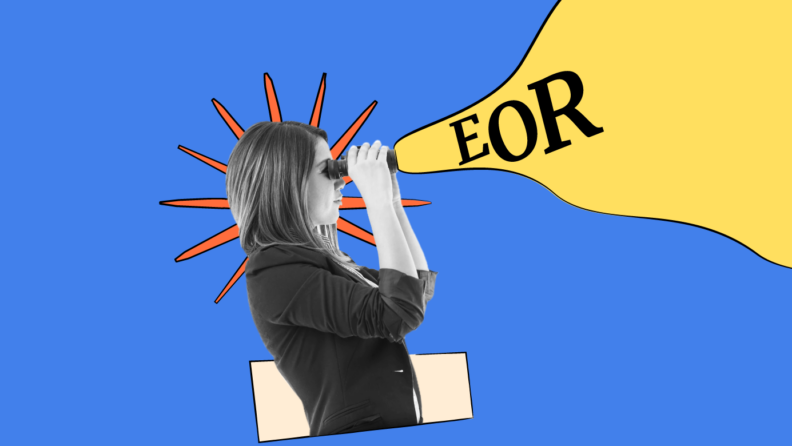Not too long ago, organizations had limited options when it came to hiring international workers.
They could hire contractors, but not offer them time off, health insurance, pensions or other benefits. They’d also be open to misclassification risk if, for example, they treated foreign contractors as employees in all but name.
Enter employer of record (EOR) services.
The EOR model enables organizations to hire full time workers, and offer appropriate benefits and perks, with none of the hassles of being the legal employer. EORs also act as local partners that can provide legal, cultural and professional knowledge.
Here I’ll cover what an employer of record is exactly, benefits and risks, and how to choose the right partner for you.
What Is An Employer of Record?
An employer of record works on behalf of clients to take on the legal responsibilities of being the employer for workers in a specific country or region, normally (but not always) outside of the client’s home region.
The client takes on the employee’s day-to-day work and tasks, while the EOR manages the legal employment side.
What Does An Employer Of Record Do?
The EOR officially employs workers in the target country and partners with the client organization to provide the best employment experience to the client’s staff.
Support spans across several areas from legal to compliance to payroll.
Legal employment
The EOR officially employs the worker in the target country, handling all legal and regulatory aspects, including contracts, taxes, benefits, payroll, and compliance with local labor laws.
Payroll and benefits
The EOR manages payroll, withholds appropriate taxes, and ensures that employees receive the required benefits (such as health insurance, paid leave, etc.) based on local laws and regulations and any additional benefit provided by the client company (such as performance bonus or additional paid leave).
Compliance
The EOR ensures compliance with local labor laws, including wage laws, work hours, termination procedures, and other regional or country-specific employment regulations (such as privacy or human rights policies).
Both parties are responsible for upholding their side of the bargain here, and the EOR can function as an expert guide for the client to navigate unknown territories.
Onboarding and training
The EOR will typically handle setting up employees with the necessary tools and resources. Any training is often handled in collaboration with the EOR, ensuring that employees meet local compliance standards, but the client organization will normally still provide role-specific training tailored to your business needs.
Relocation support
An EOR can assist with relocation support by managing the legal and administrative aspects, such as work permits, visa applications, and compliance with local labor laws for employees moving to a new location.
When To Use An Employer Of Record
While EORs are generally associated with international hiring, there are some domestic applications as well.
Here are some scenarios when organizations might want to contract an EOR:
1. Hiring international employees without a local entity
When a company wants to expand its workforce into a foreign country but doesn’t have a local entity, an EOR allows them to legally hire people without the complexity and cost of setting up a local office.
2. Hiring contractors as employees
If a company wants to offer benefits like health insurance or paid time off to contractors, an EOR can help reclassify them as employees and handle the legal and administrative responsibilities, such as taxes and payroll.
3. Managing temporary or seasonal workers
An EOR can be useful for companies hiring temporary or seasonal employees, helping manage the complexities of payroll, benefits, and compliance during high-demand periods without long-term commitments or additional administrative work.
4. Expedited hiring across different locations
For businesses hiring across multiple states or regions with different employment laws, an EOR ensures compliance and manages payroll and benefits for employees in those areas, making the hiring process faster and easier.
5. Mergers or acquisitions
In cases of mergers or acquisitions, an EOR can help manage the transition of employees, particularly when the company doesn't have an HR infrastructure in a new region or country, simplifying the integration process.
Employer Of Record Benefits
EORs offer several key benefits, mainly around speed to market and removing administrative headaches:
1. Simplified global expansion
An EOR allows you to hire employees internationally without the need to establish a local business entity.
This makes it easier and faster to hire internationally and expand into new countries while ensuring compliance with local laws.
2. Compliance assurance
EORs are experts in local labor laws, taxes, and regulations, reducing the risk of non-compliance.
They ensure your company adheres to all legal requirements, including contract terms, tax filings, employee benefits, and work permits.
3. Reduced administrative burden
An EOR takes on the complex tasks of payroll, benefits administration, tax filings, and managing employment contracts, freeing up your internal resources to focus on core business operations.
4. Cost savings
By outsourcing HR functions, organizations avoid the costs of setting up a local entity, hiring additional HR staff, or dealing with legal and compliance issues.
Up to a certain point, usually when the local hires are 3 or more in a single country, the fees for using an EOR are often lower than the costs associated with managing international HR processes internally.
5. Faster time-to-hire
With an EOR, you can quickly hire and onboard employees, even in countries where you don’t have an established presence.
This can be particularly helpful when you need to move fast to meet business demands or tap into global talent pools.
6. Flexible workforce management
EORs make it easier to hire temporary, seasonal, or contract workers, allowing businesses to scale up or down quickly without the need for long-term commitments or complex HR processes.
Potential Risks Of Using An EOR
While offering many benefits, there are also some potential risks of using an EOR to keep in mind:
1. Cost
EOR services can get expensive. If you’re not clear on the fees involved, such as per-employee costs, transaction fees, or additional charges for services like relocation support or benefits management, the total expense can quickly add up.
2. Limited control over HR functions
When using an EOR, the third-party provider becomes the official employer of record, which means you have less direct control over HR functions like employee relations, disciplinary actions, and performance management.
For example, the EOR may be required to handle the formal aspects of discipline, like issuing warnings or making decisions about termination, based on local labor laws.
3. Permanent establishment risk
When using EOR, businesses may worry about permanent establishment (PE) risk, especially if the EOR's services result in the company being viewed as having a taxable presence in the country.
For example, Google’s European HQ is in Dublin, Ireland, but they were forced to pay nearly €1 billion in taxes in France after authorities there determined that their operations constituted a permanent establishment.
To minimize PE risks, you should retain control over employee work and avoid crossing into “representative” activities like sales that might trigger PE status.
Also, ensure that your contracts with the EOR are structured in a way that limits your company’s exposure to PE risks.
Top tip: Consult with local tax experts who can advise on what activities may be considered a “substantial presence” and how to mitigate those risks.
4. Reputational damage
Reputational damage is another potential risk when using an EOR particularly if the EOR doesn't manage employment processes with the same level of care, compliance, or ethics that your company expects.
Since an EOR manages significant parts of your employee relations, payroll, compliance, and benefits, any failures or issues on their part can reflect negatively on your company, even though you’re technically outsourcing those functions.
5. Business continuity
When using an employer of record, business continuity risks include potential disruptions in payroll processing, legal compliance, or employee benefits administration, especially if the EOR experiences financial instability, system failures, or operational challenges.
To mitigate these risks, it’s essential to choose a reliable EOR with a strong track record, establish clear service-level agreements (SLAs), and have contingency plans in place, such as backup payroll systems or alternative providers.
6. Data protection
Data protection and security are crucial concerns when using an EOR as the EOR will be handling sensitive organizational and employee data.
This is why it’s important to go with an EOR such as Deel that adheres to global data security standards such as ISO 27001 and GDPR.
EOR vs. PEO: How Does An EOR Differ From A PEO?
The difference between an EOR and PEO mainly lies in the scope of services and the nature of the employment relationship they establish.
| Aspect | EOR (Employer of Record) | PEO (Professional Employer Organization) |
|---|---|---|
| Legal Employer | EOR is the legal employer of your workers. | You remain the legal employer; the PEO becomes a co-employer. |
| Employment Relationship | EOR hires employees on your behalf under its own entity. | You and the PEO share responsibilities for the employees. |
| Best For | Hiring in countries or states where you don't have a legal entity. | Supporting HR functions for employees where your business is already registered. |
| Entity Requirement | No need to set up your own legal entity. | You must have a legal entity in the country or state. |
| Compliance Responsibility | EOR assumes full compliance responsibility (labor laws, tax, payroll, etc.). | Shared compliance responsibility. You must still ensure local legal adherence. |
| Control Over Employees | You manage the day-to-day work; EOR handles legal employment matters. | You manage day-to-day operations; PEO supports with HR administration. |
| Common Use Cases | Global expansion, hiring remote workers quickly, short-term projects, test markets. | Streamlining HR operations, providing benefits to domestic employees, scaling operations. |
| Payroll & Benefits | Handled entirely by the EOR under its own system and registrations. | Handled through the PEO, but under your company’s tax IDs and registrations. |
| Onboarding Speed | Fast—EOR already has local infrastructure in place. | Slower—requires that your entity is in place and PEO setup is completed. |
| Termination Handling | EOR handles terminations per local laws, reducing your legal risk. | You’re generally responsible for compliance with terminations, with PEO support. |
Employment relationship
- EOR: Is the legal employer of the client's employees.
- PEO: Workers are co-employed by both the PEO and the client company.
Scope of service
EOR services are often geared towards assisting companies with international operations, facilitating employment in countries where the client does not have a legal entity.
PEO providers are generally more focused on domestic HR solutions within the client’s home country, although some PEOs also offer international services.
Legal differences
A key difference between PEOs and EORs is the legal risk that each presents as they are a bit different to one another.
For example, a significant legal risk associated with PEOs is co-employment liability.
In a PEO arrangement, both the client company and the PEO share employment responsibilities, meaning the client company retains some control over employees' day-to-day activities.
This shared responsibility can expose the client company to legal risks, such as violations of labor laws or employment disputes, since they are still partially responsible for compliance with regulations like wage laws, workplace safety, and anti-discrimination policies.
On the other hand, an EOR takes on full legal responsibility for employees, significantly lowering the client's liability for legal risks as the EOR handles matters such as wrongful termination claims or labor law violations.
However, companies using an EOR must be careful to maintain proper management of daily employee activities, as a misstep in how authority is exercised over employees can still lead to compliance issues.
In short, PEOs expose businesses to shared legal risks, while EORs reduce direct legal liability by assuming full responsibility for employee compliance and legal matters.
For a deeper dive into PEOs, check out our article on understanding PEOs.
EOR vs Staffing Agency
The difference between an Employer of Record (EOR) and a staffing agency lies in their primary functions and the nature of the services they offer.
- Primary function: An EOR's primary function is to legally employ individuals on behalf of another company whereas a staffing agency's main role is to recruit and supply employees or temporary workers to client companies.
- Employment relationship: Staffing agencies typically employ temporary workers or contractors and then 'lease' them to client companies whereas EOR is a full-time employer.
How To Choose The Right Employer Of Record
With the above in mind, when choosing to work with an EOR as part of your international strategy, you'll want to carefully evaluate several factors to ensure they align with your company’s needs and minimize risks.
Here’s a streamlined guide to help you make the right decision:
1. Reputation and experience
Look for an EOR with a strong reputation in the industry and extensive experience in the countries or regions where you plan to hire.
Research their track record, client reviews, and any industry certifications. A reputable EOR should have a history of successfully managing global compliance, payroll, and HR functions.
2. Compliance and legal expertise
Ensure the EOR has a solid understanding of local labor laws, tax regulations, and compliance requirements in the countries where you're hiring.
For example, the EOR should be well-versed in data protection laws (e.g., GDPR) and employment regulations to help minimize legal risks and avoid penalties.
3. Providers vs aggregators
There are two types of EOR companies: providers and aggregators.
An EOR provider directly manages all the employment functions, including payroll, benefits, taxes, and compliance, for your employees in the countries you wish to hire.
An EOR aggregator acts as an intermediary, partnering with multiple EOR providers to offer services across different countries.
Both models can produce good results, but aggregators do add an extra layer of complexity and removal some might not be comfortable with.
Also, while aggregators could add some benefits such as having the same EOR for multiple countries, they may not be able to directly and successfully manage the relationship with each individual employee because they rely on third party providers.
3. Financial stability
Check the financial stability of the EOR to ensure they can handle payroll and compliance responsibilities over the long term.
A financially sound EOR will also be able to manage unexpected disruptions and have backup systems in place, minimizing risks to your business continuity.
4. Transparency in pricing
Ensure the EOR offers clear and transparent pricing with no hidden fees. Make sure you thoroughly understand the cost structure—whether it’s per employee, per transaction, or through a subscription model.
5. Data security and protection
Confirm that the EOR adheres to industry-standard data security protocols like ISO 27001 or GDPR.
They should have robust systems for data protection, including encryption, backup procedures, and disaster recovery plans, to ensure the safety of sensitive employee information.
6. Service level agreements (SLAs)
Ensure the EOR provides detailed SLAs that clearly define the level of service you can expect.
SLAs should cover things like payroll timelines, error resolution, compliance management, and customer support response times, giving you confidence in their ability to meet your needs.
7. Flexibility and scalability
Business strategies can evolve quickly, so look out for a partner that offers flexibility to adapt to your changing business needs, whether it's scaling up your workforce, adjusting compensation structures, or expanding into new markets.
They should also provide clear processes for transitioning employees or terminating contracts if needed.
8. Customer support
Evaluate the EOR’s customer support capabilities to ensure they offer responsive support to address any issues promptly.
Whether it’s HR-related questions, payroll issues, or compliance concerns, having reliable and accessible support is critical for the client and the employee who is hired by the EOR.
The employee will interact with the EOR throughout their employment lifecycle, and part of their engagement and retention with the client is related to how they perceive the EOR.
9. Cultural fit
Finally, consider whether the EOR can align with your company’s culture and values, particularly if you're managing remote teams or employees in diverse countries.
They should understand your work environment and be able to support your company’s approach to employee relations, performance management, and onboarding.
*DISCLAIMER: The information provided on this page is general and not meant to be provided in place of legal advice. Those interested in working with an EOR service should contact an employment lawyer with further questions.
Country-Specific EOR Services
If you’re interested in hiring employees within a specific country, our roundups of the best EOR services in the following countries might be a good place to start:
- Australia's best EOR services
- Brazil's best EOR services
- Canada's best EOR services
- Chile's best EOR services
- China's best EOR services
- Colombia's best EOR services
- France's best EOR services
- Germany's best EOR services
- Hong Kong's best EOR services
- India's best EOR services
- Indonesia's best EOR services
- Italy's best EOR services
- Japan's best EOR services
- Netherland's best EOR services
- Philippines' best EOR services
- Portugal's best EOR services
- Singapore's best EOR services
- Spain's best EOR services
- Switzerland's best EOR services
- Turkey's best EOR services
- UAE's best EOR services
- United Kingdom's best EOR services
Need expert help selecting the right Employer of Record Service?
If you’re struggling to choose the right service, let us help you. Just share your needs in the form below and you’ll get free access to our dedicated software advisors who match and connect you with the best vendors for your needs.





